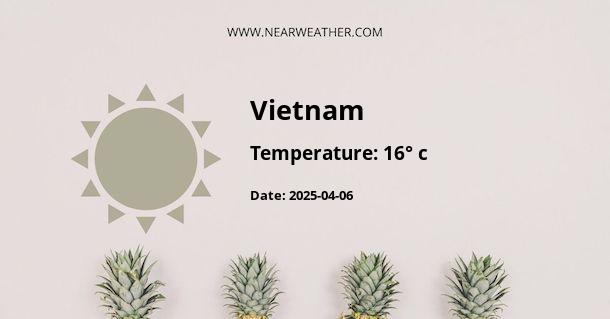Climate and Weather in the Socialist Republic of Vietnam (VN)
Vietnam, officially known as the Socialist Republic of Vietnam, is a Southeast Asian country with a diverse climate and weather patterns. Its location near the equator and extensive coastline contribute to its unique climatic conditions. Understanding the climate and weather in Vietnam is essential for travelers and locals alike to plan their activities and make the most of their time in this beautiful country.
Geographical Factors
Vietnam is a long, narrow country that stretches over 1,000 miles from north to south. Its geography is characterized by mountains, plateaus, deltas, and a long coastline along the South China Sea. This geographical diversity greatly influences the climate and weather patterns across the country.
Climate Zones
Vietnam can be divided into three main climate zones: the northern region, the central region, and the southern region.
1. Northern Region
The northern region of Vietnam, including Hanoi and Halong Bay, experiences a humid subtropical climate. Summers (May to September) are hot and humid, with temperatures averaging around 30°C (86°F). Winters (November to March) are relatively cool and dry, with temperatures ranging from 15°C to 20°C (59°F to 68°F). The region is also prone to occasional typhoons during the summer months.
2. Central Region
The central region of Vietnam, which includes cities like Hue and Da Nang, has a more complicated climate due to its diverse topography. The coastal areas have a tropical climate with high humidity and temperatures averaging around 25°C to 30°C (77°F to 86°F) year-round. The central highlands, on the other hand, experience a cooler and drier climate, with temperatures dropping to around 10°C to 15°C (50°F to 59°F) during the winter months.
3. Southern Region
The southern region of Vietnam, including Ho Chi Minh City and the Mekong Delta, has a tropical climate with high humidity and temperatures averaging around 27°C to 32°C (81°F to 90°F) throughout the year. The region is characterized by two distinct seasons: the dry season (November to April) and the wet season (May to October). The wet season brings heavy rainfall and occasional tropical storms.
Weather Patterns
Vietnam experiences a variety of weather patterns throughout the year. Here is a breakdown of the different weather patterns in each region:
1. Northern Region
In the northern region, the summer months are hot and humid, with occasional heavy rain showers. The winter months are drier and cooler, with occasional foggy days. Spring (March to April) and autumn (October to November) are considered the most pleasant seasons, with mild temperatures and lower humidity levels.
2. Central Region
The central region experiences the most rainfall during the months of September and October. The coastal areas are prone to typhoons during the summer months, which can bring heavy rain and strong winds. The central highlands have a drier climate, with less rainfall throughout the year.
3. Southern Region
In the southern region, the dry season is characterized by hot and dry weather with occasional showers. The wet season brings heavy rainfall and high humidity, with the peak of the rainy season occurring in July and August. The region is also prone to tropical storms and typhoons during this time.
Best Time to Visit
The best time to visit Vietnam depends on the specific region and activities you plan to undertake. Here are some recommendations:
1. Northern Region
The best time to visit the northern region is during the spring (March to April) and autumn (October to November) when the weather is mild and pleasant. This is also the time when the famous cherry blossoms bloom in Hanoi.
2. Central Region
The best time to visit the central region, including cities like Hue and Hoi An, is during the months of February to April and September to November. These months offer a balance of good weather, fewer crowds, and lower chances of typhoons.
3. Southern Region
The best time to visit the southern region, including Ho Chi Minh City and the Mekong Delta, is during the dry season (November to April). This period offers sunny and warm weather, ideal for exploring the city and enjoying outdoor activities.
Conclusion
The climate and weather in the Socialist Republic of Vietnam vary significantly across its three main regions. From the hot and humid summers in the north to the tropical storms in the central region and the distinct wet and dry seasons in the south, Vietnam offers a diverse range of climates and weather patterns. Understanding the climate and weather conditions in Vietnam can help travelers make informed decisions about the best time to visit and plan their activities accordingly.
A - Vietnam's Latitude is 16.166670 & Longitude is 107.833328.
A - Weather in Vietnam is 16° today.
A - Climate Conditions in Vietnam shows overcast clouds today.
A - Humidity in Vietnam is 93% today.
A - Wind speed in Vietnam is 0.5 km/h, flowing at 155° wind direction. today.
